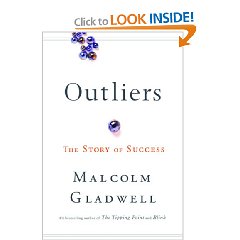Recommended Reading: Outliers, The Story of Success
Malcolm Gladwell, author of The Tipping Point and Blink: The Power of Thinking without Thinking, has written another masterful, mind-bender called Outliers: The Story of Success. The book explores the paths of successful people and, in doing so, reveals some startling truths.

Gladwell explains that, in Canada, hockey leagues start when kids are young and the cutoff age for each league is the beginning of January. If you are born on January 1, you play hockey with kids born the same year as you, through December 31. If you consider the large differences that often exist between a four year old and a five year old, consider that two players can be on the ice together that are 365 days apart (January 1 and December 31 birthdays) and what an advantage that creates for the older kid. Had that kid been born a day earlier, they would have been the youngest in the prior year's league.
This advantage leads to a little more ice time - a little extra attention from instructors. As the years go on, the starting advantage is magnified until you have a situation where the predominant number of hockey players are born at the beginning of the year.
This amazing revelation leads to a fascinating proposition: If Canada made two leagues - one for kids born the first half of the year and one born the second - they would have twice as many star hockey players.
As Gladwell points out, each star hockey player had to be good - he never questions the base assumption of gifted people needing to actually have talent - but they also had to be born at the right time. If not, they faced tremendous odds that those born in the beginning of the year did not. This fact holds true through the many mind-expanding examples he gives in the book. Someone can have all the talent in the world but, if the right opportunity is not there, that talent will likely not mature.
The book challenges our base assumption that talent and hard work are all that is needed to get ahead. In doing so, the book presents an inspiring challenge for the future.
"To build a better world we need to replace the patchwork of lucky breaks and arbitrary advantages that today determine success - the fortunate birth dates and the happy accidents of history - with a society that provides opportunity for all. If Canada had a second hockey league for those children born in the last half of the year, it would today have twice as many adult hockey stars. Now multiply that sudden flowering of talent by every field and profession. The world could be so much richer than the world we have settled for."
Amen.
This book was inspiring in how simple it would be to dramatically make the world much richer, yet frustrating to know how many arcane social norms would need to be overcome to make it happen. Vintage Gladwell, challenging our simplistic world view and opening our minds to beautiful possibilities. A must read.
